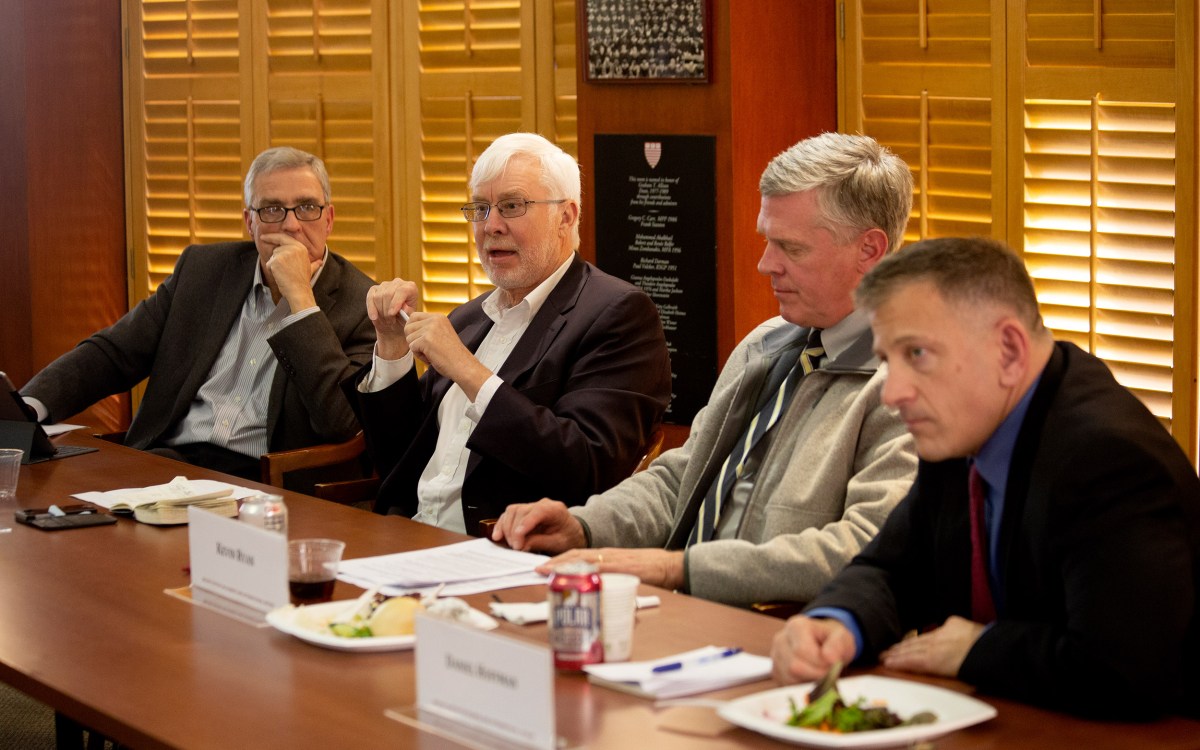
Calder Walton, the general editor of “The Cambridge History of Espionage and Intelligence,” was asked to contextualize the FBI’s Russia investigation and the role other intelligence agencies may be playing in it.
Rose Lincoln/Harvard Staff Photographer
It’s spy vs. spy vs. spy
Harvard fellow will co-edit three-volume series tracing espionage from ancient times to today
Spying is a secret world that strives mightily to stay out of the public eye. But in an age of almost limitless electronic surveillance, that’s become much harder to do.
Just in the past year, three men identified as Russian military intelligence officers were accused of poisoning a former spy, his daughter, and two others, using a deadly nerve agent. A Russian woman acting as a graduate student admitted to U.S. prosecutors that she was an agent for Russia while cozying up to officials in the National Rifle Association and the Republican Party. And this week, former Acting FBI Director Andrew McCabe said that he opened a counterintelligence investigation into whether the president might have been acting on behalf of Russia after Trump fired McCabe’s boss while the FBI probed that country’s meddling in the 2016 U.S. election.
Suddenly, the topic of spies and spying dominates newsfeeds. Yet much of what the public and even policymakers know about this complicated subject is shaped by old James Bond films or John le Carré novels — and that needs to end, according to Calder Walton, Ernest May Fellow in History and Policy at Harvard Kennedy School (HKS).
Walton studies intelligence history and international relations, and co-runs the Applied History Project at HKS. He was recently named general editor of “The Cambridge History of Espionage and Intelligence,” to be published by Cambridge University Press in 2022. The three-volume work will document for the first time the vast and largely opaque record of how undercover information-gathering has been used and misused in conflicts from the ancient world through the cyberwarfare of the present.
The Gazette asked Walton to help contextualize the FBI’s Russia investigation and the role other intelligence agencies may be playing in it, and to explain how intelligence and espionage have changed — and remained unchanged — since their earliest days.
Q&A
Calder Walton
Gazette: First, what is the difference between espionage and intelligence?
Walton: Espionage traditionally refers to human spies and spying. Intelligence is much broader. It can mean human intelligence, but it also can mean technical intelligence operations, like signals intelligence, or code-breaking, or imagery intelligence. Intelligence is not mysterious: It is secret information, which, by definition, requires secret means to obtain. Sometimes there’s not that much difference between publicly available information in The New York Times, for example, or in the Harvard Gazette, and in intelligence briefings — and when that happens, policymakers rightly ask what’s the point of intelligence briefings if they can read the same or similar information in the press? The purpose of intelligence is to provide policymakers, decision-makers, with something extra — something they can’t obtain, read, or see on the news or some other way. So, at its most basic, the purpose of intelligence is to help policymakers make their decisions. It’s to be able to know about enemies’ intentions and capabilities, and it is to be able to know about threats on the horizon. It doesn’t always work, as we’ve seen recently, but that’s the aim.
GAZETTE: Is it always conducted by one government or state against another?
Walton: Not necessarily. Intelligence existed even before there were states, as we understand them today — it goes back to the ancient and nomadic worlds. Today, intelligence is also being conducted in another way outside of governments and states: With the privatization of intelligence, with big businesses like Facebook, hoovering up data, intelligence exists in the private sector as well as the government. In fact, big companies like Facebook now know arguably more about people than even the government, in some cases. So that’s a form of intelligence. It doesn’t have to be state-to-state. But traditionally, for the 18th, 19th, and 20th centuries, it was state-to-state, yes.
GAZETTE: What do you make of news that the FBI opened an investigation into whether the president of the United States has been working on behalf of Russia? In the history of Western espionage, has there been anything comparable to a major world power like the U.S. possibly being controlled by an enemy agent like Russia?
Walton: I think what we’re seeing unfolding on the news every day right now is, potentially, the greatest intelligence or espionage scandal in modern history, maybe in history, full stop. The Kremlin has managed to get a candidate who’s very favorable to itself in the White House. It is still slightly hypothetical, because we don’t know the results of the investigation, but the fact that [the FBI] started an investigation at all, and this question had to be asked at all, shows how weird and unprecedented this situation is. If the music stops right now and actually there’s nothing to it, still the fact that we had to ask this question, and it was investigated, is extraordinary.
My inclination is to say the FBI would have had to have a strong basis of evidence. Where did the information probably come from? We’ll hopefully know in 50 years’ time when the records are out, but it seems likely that they probably came from different sources, from signals intelligence, maybe from human sources, from foreign intelligence and from allies, as well. Unlike the U.S., and this is a crucial point, where there are restrictions on eavesdropping of phone calls and communications of U.S. citizens, those rules don’t apply to international allies. So it may well be that closer allies like Britain or Germany would have been collecting phone calls in a way the U.S. wasn’t. But it would not be inconceivable to say “this happened.”
I’m struggling to find another parallel where Russia or another known power might have helped to install someone with loyalty to another country in the White House or in particular behind the Resolute Desk in the Oval Office. The Kremlin used the KGB repeatedly throughout the Cold War to meddle in U.S. domestic politics. Every major branch of [President Franklin Roosevelt’s] wartime administration was penetrated by Soviet intelligence — in particular by now-infamous KGB agents such as Alger Hiss, who was working in the State Department. Also, FDR’s close adviser Harry Hopkins had set it up so that if, in 1944, FDR died — and unfortunately, it looked quite likely that he was going to die then — he would appoint Alger Hiss to be his secretary of state and Harry Dexter White to be his secretary of the treasury. And we now know from KGB records that both were Soviet agents.
In 1968, the Kremlin offered to secretly subsidize the election campaign of Hubert Humphrey, who was running against Richard Nixon. He politely turned down the Kremlin’s offer. The KGB’s greatest attempt to meddle in U.S. presidential elections in the Cold War was against Ronald Reagan, whom the Kremlin regarded as the greatest single threat to the Soviet Union, which he probably was. So, in his various election bids, they did everything that they could, first, to undermine him, and second, to gather compromising material on him. They tried to dig up anything they could that would blacken his name, but they couldn’t find anything. And when that happened, they tried to do anything they could to support his opponents. Moscow sent a telegram to the KGB officers stationed in the U.S. saying essentially, “It doesn’t matter which party you get an agent in, Democrats or Republicans, but whoever it is must defeat Ronald Reagan.” None of this worked. Reagan won in a landslide. But the Kremlin’s strategy was clear: promote favorable candidates and undermine those hostile to Moscow.
There have been extraordinarily high-level penetrations of the KGB, and then Russian intelligence, into the U.S. intelligence community itself as recently as the 1990s with Aldrich Ames, who was, at one point, the head of CIA Soviet counterintelligence, and Robert Hanssen, who was in the FBI.
Even if this is nothing, the fact that we’re all spending so much time on this serves the Kremlin only too well in its long-term strategic aims.
“The old phrase ‘gentlemen don’t read each other’s mail’ was unfortunately the dominant U.S. attitude before the Second World War — with catastrophic consequences at Pearl Harbor. … America learned the hard way: In reality, that was what everyone else was doing, and America was being not only naïve, but putting itself at risk by not doing so.”
GAZETTE: What can you tell us about the forthcoming book project, “The Cambridge History of Espionage and Intelligence,” that you’re co-editing with Christopher Andrew, the renowned British intelligence historian?
Walton: I’m thrilled to be leading this project, which will be a landmark three-volume study. There are about 30 chapters in each volume. The first volume is the ancient world and the medieval world; the second volume is from the Renaissance to the First World War. The First World War marked a major change in terms of the way the government gathered intelligence. And the third volume is from the First World War to present-day cyberwarfare.
I’m general editor of the whole project, and also volume editor of the third volume on the 20th century. I’ll be contributing at least three chapters and also an introduction and a conclusion. Once we’ve got all 90 chapters together, then, as the two general editors, we will be bringing the whole thing together and trying to answer a fundamental question: Looking at this whole enormous tapestry of history, what difference can we say intelligence has made to statecraft and warfare? That’s really the aim of the whole project. What difference has it made? Does it make a difference, and if so, how? When and why hasn’t it made a difference? And what are the broad trends and themes that will help us understand intelligence — how it can be used and how it can be abused or misused? We’re calling the project, somewhat tongue-in-cheek, “Intelligence from Plato to NATO.”
Gazette: Will any of the research be done at Harvard?
Walton: Yes, absolutely. I’m here and we’ve got obviously a wonderful collection of historians here. We’re hoping to involve a number of historians at Harvard. The project fits well with the public policy research of HKS — in this case, informing policymaking by learning from history. I’m excited to bring it to the Applied History Project at HKS, which I help to run, and also the Intelligence Project at HKS, which I’m part of. My aim is to use “The Cambridge History of Intelligence” to make HKS into a world-leading center for the study of intelligence history. “The Cambridge History” has a clear applied-history spirit to it in that it’s trying to understand what’s going on today by looking to the past. That’s really what we’re trying to do.
Gazette: Technology aside, how does intelligence and espionage today differ from 100 years ago, 500 years ago? Because at the end of the day, people are still people. We haven’t changed very much, I imagine.
Walton: That’s right. The joke is that it’s the world’s second-oldest profession. Humans are humans, as you just said. Having a well-placed spy in your enemy’s camp, that’s the same as it’s always been and will always continue to be even in the cyber era, with the role of the human agent who can give you codes and passwords into an enemy state or nonstate actor that is trying to launch a cyberattack. If you have an agent who can give you those passwords, that’s clearly crucial. It’s also no different than how agents have been recruited all throughout history.
Aside from technology, the old phrase “gentlemen don’t read each other’s mail” was unfortunately the dominant U.S. attitude before the Second World War — with catastrophic consequences at Pearl Harbor. There was a belief in the U.S. government before World War II that lowering yourself to intercepting communications, well, that’s not what gentlemen did. But America learned the hard way: In reality, that was what everyone else was doing, and America was being not only naïve, but putting itself at risk by not doing so.
How different are government interception activities today from the past? They’re different in scale and nature, obviously, with the digital revolution, the interconnectivity of everybody in the world, so there’s more data than ever before, and it’s growing exponentially. Government agencies and businesses are gathering more data more quickly than ever before. But the principle of intercepting communications that someone wants to keep secret, involving people aiming to do harm in one way or another, that goes right back to the ancient and classical world. So, the principle is the same, but the scale at the moment almost beggars belief compared to the past — a seismic change.
The digital revolution unfolding in front of us right now, with knock-on consequences for intelligence gathering, is analogous to the development of the printing press in the 1400s. Both are revolutions in the transmission of ideas. And we saw what the printing press unleashed within Europe and then the New World. I think it’s safe to say that if that past is a guide, then the cyber revolution today will also be unleashing all sorts of social revolutions and dislocations that we can’t predict at the moment, but it definitely has an intelligence component for private business, citizens, and government.
Gazette: If most of the espionage techniques, the active measures, Russia used in the 2016 election and is still using to shape U.S. politics and public opinion are straight from the old Soviet intelligence playbook, why are they still effective?
Walton: You’ve hit on something that’s really close to my heart. We do know about these techniques — information about the KGB’s playbook is in the public domain — the professionals know about them within the FBI and the CIA. The problem is there’s a massive, yawning gap in terms of the public understanding about Russian active measures, in particular, and intelligence more generally. From my perspective, much of this stems from the fact that intelligence is not addressed in serious books of history. I guarantee you that if you pick up most books on post-war international relations, U.S. foreign affairs, and some of the best and most recently published books on the Cold War, intelligence is addressed in a lopsided manner, at best — more often as footnotes of history. You will likely find references to what the CIA did, about how they meddled in foreign countries and launched coups. But I guarantee you that you will find hardly any mention of the KGB, or Soviet active measures. The result is you’re given this lopsided, one-sided view of history where the CIA was apparently active in these countries doing various things, instigating coups, but there’s no mention of what the KGB was doing in those same countries. We are supposed to believe that CIA was operating in a vacuum.
In reality, KGB active measures were often on a much larger scale than anything the CIA could marshal in the Cold War. So, part of the surprise and shock about recent revelations about Russian active measures, from poisonings in England to election meddling in the U.S., has arisen because of a lack of public understanding about their long history. I’m afraid it has a lot to do with historians and scholars of international relations not incorporating intelligence into their work. From my perspective, this is going to be my lifetime’s work, to try to get the use and abuse of intelligence incorporated into international relations scholarship in a way it is not at the moment.
This interview has been edited for clarity and length.






